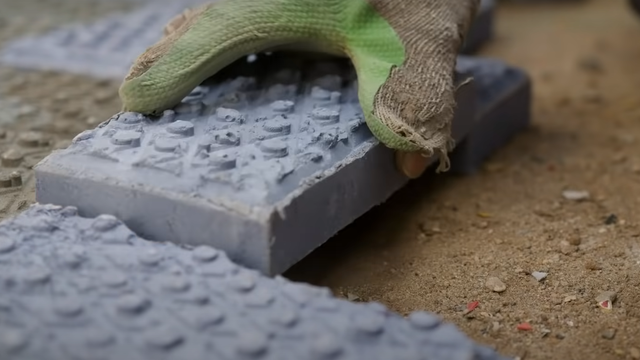TECH

A Kenyan engineer has created a solution that combines sustainability, innovation, and social impact. The factory founded by Nzambi Matee recycles 1.5 tons of plastic per day and produces bricks up to five times stronger than concrete — changing infrastructure and income in vulnerable neighborhoods.
What began as an improvised experiment in a backyard has become a global symbol of environmental innovation. Kenyan engineer Nzambi Matee found a way to transform plastic waste into super-strong building blocks. Today, her startup Gjenge Makers recycles tons of waste daily and helps build a more sustainable future — one brick at a time.
In 2020, Reuters showed the world the small factory that Nzambi set up in Nairobi. Three years later, the project has evolved: Gjenge Makers recycles 1,500 kg of plastic per day and manufactures bricks that, according to independent tests, are five times stronger than ordinary concrete.
The secret lies in the mixture of sand and plastics such as polyethylene and PET, which are heated and compressed until they form ultra-dense blocks. The result is a durable, inexpensive material ideal for sidewalks, patios, public areas, and small constructions.
In many neighborhoods of Nairobi, Matee's bricks are already changing landscapes: squares, schools, and community centers have gained resistant and sustainable pavements. In addition, the project generates income for local residents, who participate in the collection and separation of waste.
With this, the engineer created a circular economic cycle: the waste that once clogged rivers and streets is now transformed into jobs, infrastructure, and dignity for entire communities.
Matee's journey did not begin with resources or institutional support. She melted plastics with improvised tools, testing hundreds of combinations until she arrived at the ideal formula. In 2020, she was recognized as a Young Champion of the Earth by the UN Environment Programme — an award that boosted the growth of the factory and the international visibility of the initiative.
Today, Gjenge Makers is a benchmark in sustainable innovation and social entrepreneurship, inspiring similar projects in other countries in Africa, Asia, and Latin America.
An exportable and promising model...Experts see the project as a practical solution for countries facing two major challenges simultaneously: excess plastic waste and a deficit of urban infrastructure. The startup already plans to automate part of the production and license the technology to new factories, expanding its global impact. Although the blocks do not yet replace concrete in large vertical constructions, they are perfect for community buildings and urban paving, with reduced costs and a smaller ecological footprint.
Education and a sustainable future...More than bricks, Nzambi Matee builds awareness. His team organizes workshops on recycling and the circular economy in schools and communities, showing that innovation and environmental responsibility go hand in hand.
From an improvised workbench to a factory that transforms tons of plastic a day, his story proves that great solutions can be born from small ideas — and that the future of construction can, indeed, be shaped from waste.
The beginning of everything...Plastic waste is one of humanity's greatest challenges, but a Kenyan engineer has presented a possible solution to this problem. Nzambi Matee and her company, Gjenge Makers, have developed a way to recycle the material and transform it into a building material that could replace concrete.
The organization specializes in recycling plastic to transform it into paving blocks, and highlights some significant advantages in its application, which go beyond environmental concerns. It is also seven times stronger, 15% cheaper to produce, and, on top of that, weighs half as much, which brings great logistical advantages.
Matee explains that plastic is, by nature, a fibrous material. For this reason, when mixed with sand, subjected to extreme heat and compressed, it can be molded into a brick with great compressive strength.
Thanks to the procedure developed by Matee and her colleagues, it is possible to eliminate the formation of air pockets inside the blocks. The result is a firmer material that shouldn't crack as easily, even when subjected to strong impacts or extreme weather conditions.
The engineer's idea came from observing the amount of plastic waste in her country. She explains that the capital, Nairobi, alone discards 500 tons of the material every day. Only 10% of that is destined for recycling, so there is great potential for reuse.
There are some limitations, however. Not just any type of plastic can be reused in the process. Of the seven main types, only four can be used to produce the blocks; among those excluded is PET, so widely used in bottles.
Furthermore, Gjenge Makers also plans to explore new materials beyond plastic. “We want to be leaders in alternative construction products. Plastic is our first area of focus,” Nzambi Matee told AFP in an interview.
mundophone

No comments:
Post a Comment